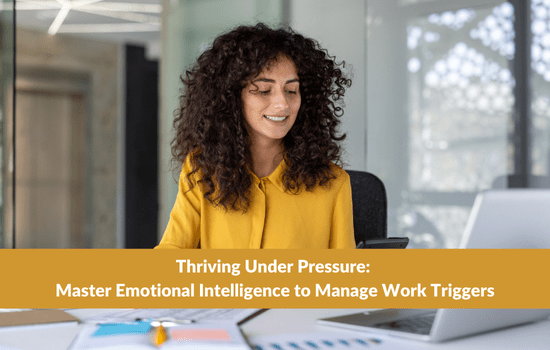We've all been there: a looming deadline, a difficult conversation with a colleague, or a client issue that feels overwhelming. In these moments, how we manage our emotions can determine our success. Emotional regulation and self-management are essential for handling workplace challenges, maintaining productivity, and fostering emotional well-being. Once you've identified your workplace triggers, the next step is to develop strategies that support stress management, resilience, and proactive communication, key components of emotional intelligence.
Mastering Emotional Intelligence: Strategies to Manage Work-Related Stress

Workplace stressors are inevitable, but your emotional response to them plays a critical role in your ability to thrive professionally. By applying emotional intelligence strategies, you can effectively manage stress and regulate your emotions in high-pressure situations. These strategies help you stay composed, reduce burnout, and transform stressful situations into opportunities for growth.
Let's explore practical strategies to manage emotional responses and stay on top of workplace stress:
Five Strategies for Managing Emotional Responses
-
Reframe the Situation with Cognitive Flexibility
-
Shift your mindset: Instead of viewing a tight deadline as an overwhelming pressure, see it as an opportunity to demonstrate efficiency.
-
Use positive self-talk: Replace negative thoughts like "I'll never get this done" with "I can break this into manageable steps."
-
Recognize progress: Celebrate small milestones to maintain motivation.
-
-
Develop a Personalized Stress Management Toolkit
-
Practice mindfulness: Take five minutes for deep breathing exercises before a stressful task.
-
Use movement: Engage in stretching or take short walks to release tension.
-
Create a calming environment: Play instrumental music, use essential oils, or adjust lighting for a soothing workspace.
-
-
Strengthen Emotional Boundaries and Self-Regulation
-
Set clear work hours: Establish boundaries to prevent burnout and maintain a healthy work-life balance.
-
Pause before reacting: Give yourself at least 10 seconds (or better yet, follow the 24-hour rule) before responding to triggering emails or conversations.
-
Name it to tame it: Labelling emotions (e.g., frustration, anxiety, disappointment) can reduce their intensity and help you manage them better.
-
-
Prioritize Clarity and Proactive Communication
-
Seek clarification early: Prevent misunderstandings by asking questions and ensuring alignment with colleagues and teams.
-
Summarize key takeaways: After meetings, send brief summaries to ensure alignment on action items and goals.
-
Use assertive communication: Express concerns clearly and respectfully, preventing escalation and ensuring a productive discussion.
-
-
Leverage Emotional Intelligence in Workplace Interactions
-
Regulate your tone and body language: Maintain professionalism under challenging conversations, fostering a collaborative environment.
-
Recognize emotional cues in colleagues: Recognizing others' emotions helps you adjust your approach and de-escalate tense situations.
-
Seek mentorship and feedback: Regularly check in with mentors or trusted colleagues to refine your communication and stress management strategies.
-
Real-Life Application: A Case Study of Emotional Intelligence in Action
Imagine Sarah, a team leader in a fast-paced marketing agency. One day, she receives an urgent request from a client, and her team is already stretched thin. Instead of reacting impulsively, Sarah applies emotional regulation by taking a brief pause, reframing the situation, and calmly addressing her team with a clear, composed plan. Sarah's ability to regulate her emotions helps her maintain control, make strategic decisions, and lead her team effectively.The Power of Emotional Intelligence
Mastering emotional intelligence in the workplace enables you to respond, not react, to stressful situations. This shift fosters resilience, enhances collaboration, and boosts overall workplace productivity. As Daniel Goleman, a leading expert on emotional intelligence, aptly states: "In a very real sense, we have two minds, one that thinks and one that feels. Mastering both is the key to success."
By consistently applying emotional regulation strategies, you can navigate stress with composure and lead with confidence. Embracing emotional intelligence isn't just about managing work triggers, it's about cultivating a mindset that strengthens your decision-making, communication, and long-term growth.
Ready to Start Your Journey?
If you're ready to deepen your emotional intelligence and refine your self-management strategies, The Power of Emotion offers practical techniques for managing emotions and navigating work-related stress. Additionally, my newest book, The Mindful Journal: Cultivating Emotional Intelligence through Reflective Writing, offers 115 days of self-discovery through reflective prompts. It’s a powerful tool for unlocking emotional intelligence and fostering lasting personal growth.
Take Your First Step Toward Lasting Change
Mastering emotional intelligence not only transforms how you handle stress at work, but it also empowers you to become a more confident, effective, and resilient leader. Start your journey today and turn workplace pressure into opportunity. Get your copies today and begin your transformation!
More Motivational Reads Here »
How Emotionally Intelligent Are You?
Sign up for Linda’s monthly tips to build your Emotional Intelligence and reduce Emotional Hijacking!

















